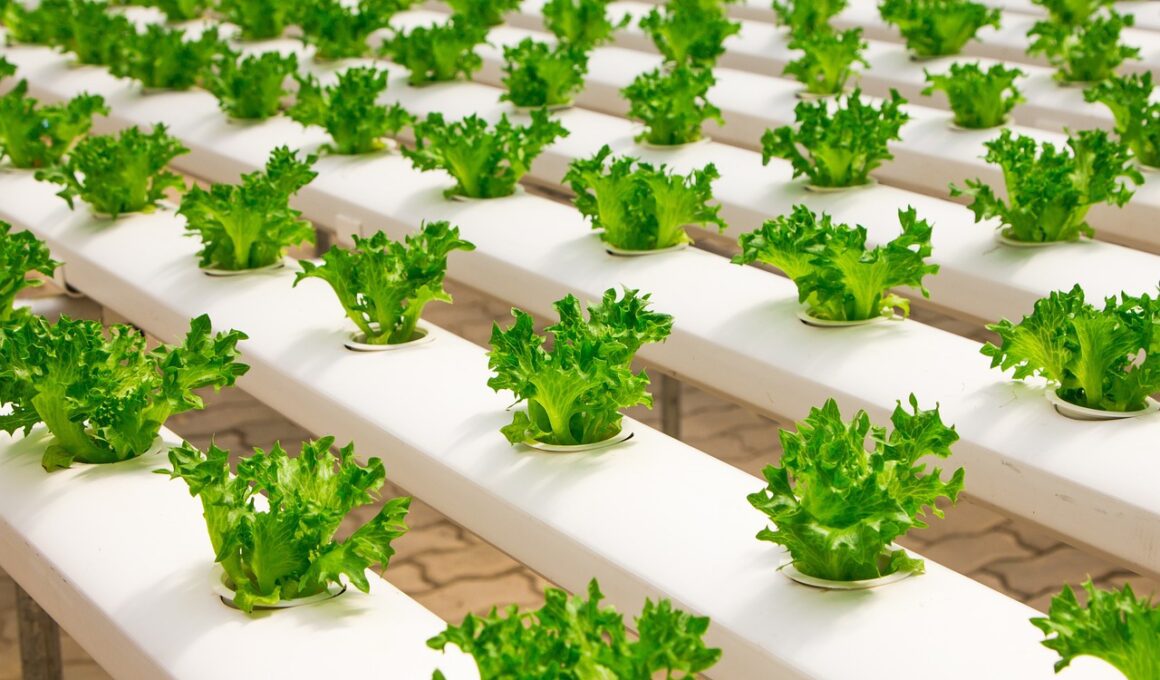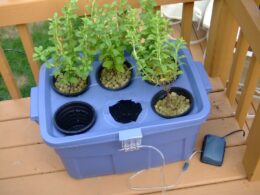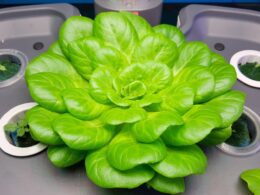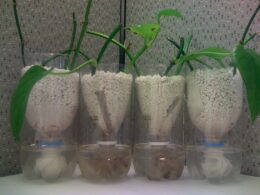Do you want to grow onions but are limited by space or weather conditions? Hydroponic growing might be the solution you are looking for.
Hydroponics is a method of growing plants without soil, using a nutrient-rich water solution instead. This method has gained popularity in recent years due to its efficiency and sustainability.
One question you may have is whether onions can grow hydroponically. The answer is yes, onions can thrive in a hydroponic system. In fact, hydroponic growing can provide an ideal environment for onions to grow, allowing you to harvest fresh and flavorful onions all year round.
In this article, we will explore the basics of hydroponic growing and techniques for growing onions hydroponically. We will also discuss the advantages and challenges of this method and provide tips for harvesting and maintenance. So, let’s dive in and learn more about hydroponic onion growing.
Understanding the Basics of Hydroponic Growing
Let’s dive into the fundamentals of growing plants without soil and discover the fascinating world of hydroponics. Hydroponic systems have been around for centuries and they’re a great way to grow plants without using soil.
Instead, plants are grown in a nutrient-rich solution that provides them with the necessary nutrients for growth. One of the main benefits of hydroponic systems is that they provide plants with a consistent supply of nutrients. Unlike soil, which can have varying levels of nutrients, hydroponic solutions are carefully controlled to ensure that plants get exactly what they need.
This means that plants can grow faster and produce more yield. Plant nutrition is also a crucial aspect of hydroponic growing. In a hydroponic system, the nutrients that plants need are dissolved in water, and then the plants absorb them through their roots.
This makes it easier for plants to get the nutrients they need, and it also helps to prevent nutrient deficiencies. In addition, hydroponic systems allow for better control over pH levels, which is important for plant growth. By monitoring and adjusting the pH levels in the nutrient solution, plants can absorb nutrients more efficiently and grow more quickly.
Advantages of Growing Onions Hydroponically
If you’re looking to increase your onion yield while saving space, hydroponic growing may be the perfect solution for you. With this method, you can expect faster growth rates compared to traditional soil growing.
Plus, by using a hydroponic system, you can grow onions all year round, no matter the season.
Increased Yield
You can easily maximize your crop output and boost your profits by employing innovative techniques for cultivating onions hydroponically. With optimized nutrients and lighting requirements, you can significantly increase the yield of your onion crops.
Here are three ways hydroponic growing can help you achieve this:
-
Better nutrient absorption: With hydroponic growing, you can control the nutrient levels of your onion plants, ensuring they receive the exact amount of nutrients they need to thrive. This results in better absorption of nutrients, leading to healthier and more productive plants.
-
Faster growth rate: Hydroponic growing allows for faster growth rates compared to traditional soil-based growing methods, which translates to higher yields in a shorter amount of time.
-
Space efficiency: Hydroponic systems take up less space than traditional soil-based growing methods, making it possible to grow more onions in a smaller area. This means you can increase your crop output without the need for additional land or resources.
Faster Growth
By utilizing hydroponic systems, you can achieve faster growth rates and experience the thrill of seeing your crops flourish in record time. One of the key ways that hydroponic systems promote faster growth is through the use of optimal lighting and nutrient solutions.
With hydroponics, you can customize your lighting and nutrient levels to the specific needs of your crop, allowing them to grow faster and more efficiently than they would in traditional soil. When comparing growth rates between hydroponic systems and traditional soil methods, it’s clear that hydroponics come out on top.
Due to the precise control over environmental factors, hydroponics can produce crops up to 30% faster than traditional soil methods. This means that you can enjoy a higher yield of onions in a shorter amount of time, making hydroponics a great option for those looking to maximize their crop output.
Space Saving
Looking for a way to maximize your indoor gardening space? Hydroponic systems are a great option for those looking to save space while still enjoying fresh produce.
Vertical farming is a popular technique used in hydroponic systems, allowing plants to grow upwards instead of outwards. This means you can grow more plants in a smaller area, making it a great option for those with limited space.
Container gardening is another way to save space with hydroponic systems. Instead of planting in the ground, plants are grown in containers filled with a nutrient-rich solution. This allows for more flexibility in terms of where the plants can be placed and makes it easy to move them around as needed.
Plus, with the controlled environment of hydroponic systems, you can grow plants year-round, making it a great space-saving option for those who want fresh produce all year long.
So why not try hydroponic systems for your indoor gardening needs and save some space in the process?
Challenges of Growing Onions Hydroponically
Growing onions hydroponically can be challenging, but with proper care and attention, it can be a rewarding experience. You’ll need to pay close attention to the nutrient requirements of the plants, ensuring they have the right balance of essential elements.
Temperature and humidity control are also key factors to consider, as onions require a specific range of conditions to thrive. Additionally, pest and disease control will be necessary to prevent common issues like fungal diseases and insect infestations.
Nutrient Requirements
To successfully cultivate onions through the hydroponic method, you’ll need to ensure that all necessary nutrients are readily available to the plants. This means that you’ll need to carefully manage your hydroponic nutrient solutions to make sure that the onions receive the right balance of nutrients.
When it comes to onions, there are a few key nutrients that are particularly important:
-
Nitrogen: This nutrient is essential for onion growth and helps to promote the development of healthy leaves and stems.
-
Phosphorus: Phosphorus is important for root development and helps to promote onion bulb growth.
-
Potassium: Potassium is essential for overall plant health and helps to increase the plant’s resistance to disease and stress.
To ensure that your onions receive these nutrients, you’ll need to carefully monitor your hydroponic nutrient solution and make adjustments as necessary. You’ll also need to pay close attention to pH management, as onions require a slightly acidic growing environment.
By providing your onions with the right nutrients and pH levels, you can help to ensure that they grow strong and healthy in your hydroponic system.
Temperature and Humidity Control
Maintaining proper temperature and humidity levels in your hydroponic system is crucial for creating an optimal growing environment and ensuring the success of your crop.
Optimal conditions for temperature and humidity can vary depending on the type of crop you’re growing, but generally, a temperature range of 65-75°F and a humidity level of 50-70% is ideal.
To achieve these conditions, you may need to invest in equipment such as a thermometer, dehumidifier, and humidifier. When it comes to temperature, it’s important to monitor it closely and make adjustments accordingly.
If the temperature is too high, it can cause your plants to wilt, while if it’s too low, it can slow down growth. Humidity, on the other hand, affects how much moisture your plants can absorb.
If it’s too low, your plants can dry out, while if it’s too high, it can create an ideal environment for mold and fungus to grow. By investing in the right equipment and monitoring your temperature and humidity levels regularly, you can create the optimal growing conditions for your hydroponic onions.
Pest and Disease Control
Now that you’ve successfully controlled the temperature and humidity levels in your hydroponic onion garden, it’s time to move on to the next challenge: pest and disease control. This is an important aspect of hydroponic gardening because pests and diseases can quickly spread and destroy your crop if they’re not managed properly.
To ensure the health and safety of your onions, it’s important to implement an integrated pest management (IPM) strategy. This involves using a combination of cultural, physical, and biological methods to prevent and control pests and diseases.
Here are four natural remedies you can use to keep your hydroponic onion garden free from pests and diseases:
-
Neem oil: This natural oil is derived from the seeds of the neem tree and is an effective insecticide and fungicide. It can be sprayed directly onto the leaves of your onions to control pests and diseases.
-
Beneficial insects: Introduce beneficial insects like ladybugs and lacewings into your hydroponic garden. These insects will eat harmful pests like aphids and mites, keeping your onions safe.
-
Companion planting: Plant herbs like basil, thyme, and mint alongside your onions. These plants will repel pests and attract beneficial insects, keeping your garden healthy.
-
Crop rotation: To prevent the buildup of pests and diseases in your hydroponic garden, rotate your crops regularly. This will help to disrupt the life cycle of pests and diseases, preventing them from becoming a problem.
Is it possible to grow Brussel sprouts hydroponically like onions?
Growing brussel sprouts hydroponically is definitely possible, just like onions. Hydroponic systems, which involve growing plants without soil, provide an ideal environment for precise nutrient and moisture control. By providing the necessary nutrients directly to the plant roots, you can support Brussel sprouts’ growth and harvest fresh and delicious sprouts all year round.
Techniques for Growing Onions Hydroponically
If you want to grow onions hydroponically, there are a few key techniques you need to master.
First, you need to select the right seeds and germinate them properly to ensure they have the best chance of success.
Then, you’ll need to transplant them into your hydroponic system and set it up correctly to provide the perfect growing conditions.
Finally, you’ll need to manage the nutrient levels in your system to keep your onions healthy and thriving.
Seed Selection and Germination
Choosing the right seeds and making sure they have enough water and light is key to getting your indoor garden off to a great start. When it comes to growing onions hydroponically, there are a few things you should keep in mind:
- Make sure you store your onion seeds properly in a cool, dry place to ensure they remain viable.
- Choose a variety of onion that is suitable for hydroponic growing, such as Ebenezer, Redwing, or Red Baron.
- Onion seeds can take up to two weeks to germinate, so make sure you are patient and keep the seeds consistently moist.
Once your seeds have germinated, you can transfer them to your hydroponic system. Make sure you have an adequate light source and continue to monitor the water levels to ensure your onions are getting the nutrients they need to thrive.
With proper seed selection and germination techniques, you’ll be on your way to a successful indoor onion harvest in no time.
Transplanting and System Setup
Get ready to set up your hydroponic system and transfer your germinated seeds, because it’s time to transplant and give your indoor garden the perfect environment to thrive!
When it comes to hydroponic medium options, there are a few to choose from. Some popular options include rockwool cubes, coconut coir, and perlite. Each medium has its own benefits and drawbacks, so it’s important to do your research and choose the one that best suits your needs.
Once you’ve chosen your medium, it’s important to consider the pH of your nutrient solution. Maintaining a proper pH level is crucial for plant growth and nutrient uptake. Most plants thrive in a pH range between 5.5 and 6.5, but it’s important to check the specific pH requirements for the plants you’re growing.
Investing in a pH meter or pH testing kit can make it easy to monitor and adjust your nutrient solution as needed. With the right hydroponic medium and proper pH levels, your indoor garden will be well on its way to success!
Nutrient Management
Now that you’ve successfully transplanted your onion seedlings into your hydroponic system, it’s time to focus on nutrient management. The hydroponic system relies heavily on the nutrient solutions to provide the necessary nutrients for your onions to grow.
Here are some tips on how to effectively manage your nutrient solutions to ensure your onions grow healthy and strong:
-
Monitor pH levels regularly: pH levels play a crucial role in nutrient uptake, and it’s important to maintain a pH level between 5.5-6.5 for optimal growth.
-
Choose the right nutrient solution: there are various types of nutrient solutions available, but it’s important to choose one that is specifically formulated for onions and that meets the requirements of your hydroponic system.
-
Maintain proper nutrient levels: too much or too little of any nutrient can have adverse effects on your onions’ growth, so it’s important to maintain proper nutrient levels by regularly checking and adjusting as needed.
-
Change nutrient solutions regularly: nutrient solutions can become depleted over time, so it’s important to change them out every 2-3 weeks to ensure your onions are receiving the necessary nutrients.
By following these tips, you can effectively manage your nutrient solutions and ensure your onions grow healthy and strong in your hydroponic system.
Harvesting and Maintenance
Now that your hydroponic onions have grown, it’s time to harvest them! Carefully remove the bulbs from the grow medium and clean them off before storing.
But don’t forget about maintaining your hydroponic system. Regular monitoring and adjustments will help ensure a successful harvest.
And when it comes to preserving your onions, proper storage is key to keeping them fresh and flavorful for as long as possible.
Time to Harvest
You’ll be excited to see the fruits of your labor and can expect to harvest your hydroponic onions in about 90 to 120 days. Harvest timing is crucial in getting the best quality onions. As soon as the leaves start to turn yellow and fall over, it’s time to harvest.
Be sure to gently pull the onions out of their growing container and remove any excess debris or dirt from the roots.
To ensure your onions last as long as possible, proper storage techniques are important. After harvesting, allow the onions to dry out in a warm, dark area for a few days. Once the outer layer of the onion is dry and papery, you can store them in a cool, dry place with good ventilation.
Avoid storing onions with potatoes or fruits, as they can cause the onions to spoil faster. With the right harvesting and storage techniques, you can enjoy your fresh hydroponic onions for several weeks.
Maintaining the Hydroponic System
Maintaining your hydroponic system is key to ensuring healthy and vibrant plants, allowing you to savor the mouth-watering flavors of your homegrown produce for weeks to come. To keep your system running smoothly, you should focus on pH balancing and water quality. Here are some tips to help you maintain your hydroponic system:
-
Check and adjust the pH level of your system regularly using a pH meter or test kit. The optimal pH level for most hydroponic plants is between 5.5 and 6.5. If the pH level is too high or too low, it can affect the absorption of nutrients by the plants, which can lead to stunted growth or even death.
-
Use clean, filtered water for your hydroponic system. Avoid using tap water, which may contain chlorine, fluoride, or other chemicals that can harm the plants. You can also add nutrients and supplements to the water to help your plants grow strong and healthy.
-
Clean your hydroponic system and its components regularly to prevent the buildup of algae, bacteria, or other contaminants that can harm your plants. Replace the water and nutrients every two to three weeks to ensure optimal plant growth.
By following these simple tips, you can maintain your hydroponic system and grow healthy and delicious onions without any soil. With a little patience and dedication, you can enjoy the thrill of harvesting your own homegrown produce in no time.
Storage and Preservation of Onions
If you want to enjoy your homegrown onions for as long as possible, it’s essential to know how to store and preserve them properly. Onion storage techniques are crucial in preventing spoilage and extending their shelf life.
One of the easiest ways to preserve onions is by keeping them in a cool, dry, and well-ventilated area. Avoid storing onions in plastic bags because they can trap moisture, leading to spoilage. Instead, use mesh bags or baskets to allow air circulation.
Another way to increase the shelf life of onions is by preserving them. You can pickle onions by slicing them thinly and placing them in a mixture of vinegar, sugar, and spices. Another preservation method is dehydration, which involves slicing onions thinly and drying them in a dehydrator or an oven. Dehydrated onions can be stored in an airtight container and rehydrated when needed.
By following these onion storage techniques and preservation methods, you can ensure that your onions last for several weeks or even months, providing you with a steady supply of homegrown onions all year round.
Frequently Asked Questions
What are the different types of hydroponic systems that can be used to grow onions?
If you’re looking to grow onions hydroponically, there are a few different types of systems you can use. One popular method is vertical farming, which involves stacking layers of plants vertically to maximize space usage.
Another technique you can try is the nutrient film technique, which involves a thin film of nutrient-rich water flowing over the roots of the plants. Both of these methods can be effective for growing onions and other vegetables hydroponically.
With the right setup and careful attention to nutrient levels and lighting, you can grow healthy, flavorful onions in a controlled environment that’s free from pests and other hazards.
So if you’re interested in hydroponic gardening, give these techniques a try and see what kind of results you can achieve!
Can hydroponic onions be as flavorful as traditionally grown onions?
When it comes to hydroponic onions, the big question on your mind might be whether they can be just as flavorful as traditionally grown onions. The answer is yes!
In fact, in some cases, hydroponic onions can actually have a more intense flavor than onions grown in soil. The key is to make sure the growing conditions are just right.
Hydroponic systems provide precise control over variables like water, nutrients, and light, which can be optimized to produce onions with the perfect balance of sweetness and pungency. So if you’re looking to grow onions hydroponically, don’t worry about sacrificing flavor – with the right approach, you can enjoy onions that are just as delicious as any you’d find in the soil.
Are there any special nutrients or fertilizers required for hydroponic onion growth?
To successfully grow onions hydroponically, you’ll need to pay close attention to their nutrient requirements and growth techniques. Onions require a balanced supply of nitrogen, phosphorus, and potassium, along with trace elements like calcium, magnesium, and sulfur.
These nutrients can be provided through a hydroponic nutrient solution, which is customized to meet the specific needs of your onion plants. You’ll also need to consider the growth techniques used for hydroponic onions, such as the type of growing medium and the lighting schedule.
With the right combination of nutrient requirements and growth techniques, you can successfully grow flavorful onions hydroponically.
How long does it typically take to grow onions hydroponically compared to traditional methods?
If you’re considering growing onions hydroponically, you may be wondering how long it takes compared to traditional soil methods. Hydroponic onion growth speed can actually be faster than soil growth, with some varieties taking only 60-90 days to reach maturity.
This is because with hydroponics, you can control the environment and provide the exact nutrients and water that the plants need. However, some argue that the flavor profile of hydroponic onions may not be as strong as those grown in soil.
Ultimately, the choice between hydroponic and traditional methods depends on your personal preferences and goals for your onion harvest.
Are there any specific pests or diseases that are more common in hydroponic onion growing?
To grow onions hydroponically, it’s important to maintain optimal growing conditions, including proper lighting, temperature, and nutrient levels.
However, there are some common pests and diseases that can affect hydroponic onion plants. These include spider mites, thrips, and onion maggots.
To prevent these pests, it’s important to keep the growing area clean and free of debris, and to regularly inspect plants for signs of infestation. Additionally, it may be helpful to use natural predators or insecticides to control pests.
By taking these steps, you can successfully grow onions hydroponically while minimizing the risk of pests and diseases.
Conclusion
So, can onions grow hydroponically? The answer is yes!
Hydroponic growing offers several advantages over traditional soil-based growing, including faster growth, higher yields, and the ability to grow in smaller spaces. However, there are also some challenges to growing onions hydroponically, such as the need for specialized equipment and a more precise nutrient balance.
Despite these challenges, there are several techniques for successfully growing onions hydroponically, including using a nutrient film technique, deep water culture, or an aeroponic system.
With the right setup and maintenance, you can enjoy a steady supply of fresh onions year-round. So why not give hydroponic onion growing a try and see for yourself the benefits of this innovative growing method?









